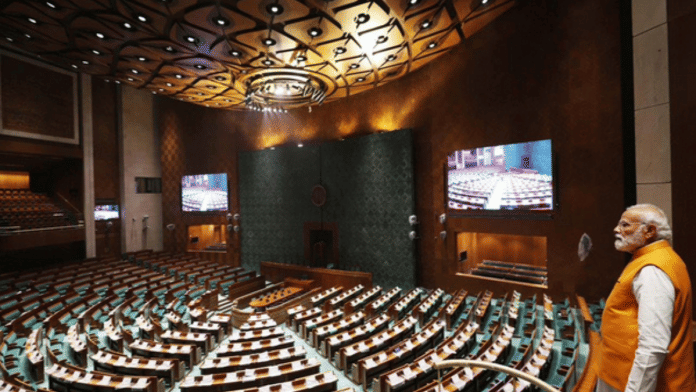The upcoming inauguration of the new Parliament building by Prime Minister Narendra Modi has been marred by controversy. On Wednesday, a Congress-led alliance of 19 Opposition parties declared their intent to boycott the event. They cited concerns over the Prime Minister’s decision to personally inaugurate the building while allegedly neglecting the role of President Droupadi Murmu.
According to the Opposition, this move not only undermines the dignity of the President’s office but also contravenes the principles outlined in the Constitution.
However, a deeper analysis encompassing legal, constitutional, and historical perspectives reveals that these allegations may be misplaced. While it would be better for the Modi government to invite the President to the inauguration function as a matter of moral practice, it is not a legal requirement.
Also read: ‘Soul of democracy sucked out:’ 19 Oppn parties to boycott PM’s inauguration of new…
Constitutional and legal standpoints
The roles and responsibilities of the President and the Prime Minister are clearly delineated in the Indian Constitution. The President’s role is primarily symbolic and ceremonial but also pivotal in ensuring constitutional propriety and integrity. The President gives assent to bills, represents the nation in official matters, and serves as the supreme commander of the defence forces.
On the other hand, the Prime Minister wields executive power, participates in policymaking and administration, chairs cabinet meetings, and plays a vital role in shaping the nation’s trajectory.
When it comes to inaugurating buildings, including significant national structures like the Parliament, the Constitution does not provide explicit instructions. The absence of specific guidance on such ceremonial activities is notable since the Constitution typically details vital aspects of the functioning of the republic.
In this context, the claim made by the Opposition that the Prime Minister’s inauguration of the new Parliament building without the President’s presence amounts to a constitutional violation lacks a firm legal basis. While convention and courtesy might suggest the inclusion of the President in such monumental events, the absence of a specific constitutional or legal requirement indicates that the inauguration is more a matter of established practice and respect, rather than a legal compulsion.
Also read: Opposition parties unite over boycott of new Parliament inauguration by PM Modi
Insights from historical precedence
Historical precedents play a crucial role in democratic traditions and processes as they offer guidance in circumstances where written laws or norms are unclear or non-existent.
Jawaharlal Nehru, India’s first Prime Minister, set many such precedents. For instance, he delivered the historic “Tryst with Destiny” speech at the stroke of India’s independence, marking a momentous occasion in the nation’s history. Although there was no official position of President in 1947, Dr Rajendra Prasad acted in a similar capacity by virtue of being the President of the Constituent Assembly, which functioned as the de facto Parliament. This system – Nehru as the Prime Minister and Dr Prasad as the President – continued after India became a republic on 26 January 1950.
Furthermore, Nehru continued to address the nation from the Red Fort on every Independence Day during his tenure, a tradition maintained by all succeeding prime ministers. This task was undertaken in his role as the Prime Minister, without undermining the stature of the President. Additionally, Nehru also inaugurated major national institutions, further consolidating the role of the Prime Minister in marking significant milestones in the nation’s development.
#WATCH | In August 1975, then PM Indira Gandhi inaugurated the Parliament Annexe, and later in 1987 PM Rajiv Gandhi inaugurated the Parliament Library. If your (Congress) head of government can inaugurate them, why can't our head of government do the same?: Union Minister Hardeep… pic.twitter.com/syv8SXGwIS
— ANI (@ANI) May 23, 2023
These actions, carried out by Nehru as the Prime Minister, set a historical precedent for the Prime Minister’s involvement in significant national events and inaugurations. This precedence invalidates the Opposition’s claim that the Prime Minister’s inauguration of the new Parliament building infringes upon the constitutional authority or respect due to the President.
Considering both the constitutional and legal perspectives and historical precedents, it can be concluded that PM Modi’s act of inaugurating the new Parliament building does not violate any legal norms or established practices. It is a reaffirmation of the democratic ethos underlying the Indian political system, representing a continuity of traditions set forth by previous leaders.
The new Parliament building symbolises India’s evolving democratic maturity and aspirations. The Prime Minister’s inauguration represents a fitting tribute to the democratic journey that India has undertaken since Independence. As the head of government, the Prime Minister symbolises the direct link between the people and their elected representatives. It affirms that the democratic institution of Parliament is a product of the people’s will.
Dilip Mandal is the former managing editor of India Today Hindi Magazine, and has authored books on media and sociology. He tweets @Profdilipmandal. Views are personal.
(Edited by Prashant)






